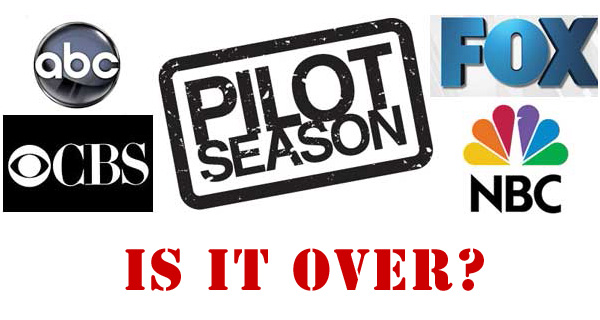FOX Ends Pilot Season: What Does This Mean for the Industry?

"If something isn’t working as well as it could be, then doesn’t it make sense to explore alternatives?"
On Monday, at FOX’s executive session, network chairman Kevin Riley unabashedly raised a sign that offered a blunt interpretation of FOX’s opinion of the current state of the television industry. “Pilot Season 1986-2013,” the sign said, marking FOX’s declaration of the death of one of most revered annual occurrences in television. For many, this is just a reaffirmation of the end of an era in television upon the realization that the need for a full-fledged pilot season is crumbling in the wake of the digital revolution's upheaval of longstanding business models.
For decades, pilot season has been at the forefront of the television industry, offering a major opportunity for show creators, writers and producers to prove they have the talent, guts and heart to make it in an industry that be both wonderful and brutal at the same time. The dream is to sell the concept, and then, with funding from the network, have a chance to make the vision a reality by creating a pilot episode. There are never any guarantees. The stakes are high, and for many show creators, writers and performers, a pilot can make them or break them: if the show makes it to air, it may offer a long and lucrative career for the people behind it, but if it doesn’t, the concept – no matter how brilliant – may never again see the light of day.
But lately, it the traditional television industry has been on standby as alternative methods of consumption take over the limited attention spans of the public. The pilot season process seems antiquated in light of the digital revolution and the YouTube generation, a constant showcase of amateur talent creating web series and serving as a source for talent for bigger projects. With FOX’s announcement comes mixed emotions from members of the industry who are now questioning what the end of pilot season for the one of the biggest networks in television could mean in terms of stability and opportunity. The answer is not clear, but one thing is: the industry is overdue for a change.
During pilot season, networks order, produce and screen pilots, often completing the dizzying cycle of pre-production, production and post-production within weeks. Typically, networks will produce dozens of pilots for different programs during pilot season, yet only a few will make it to series. However, as Riley points out, the entire process can be rushed and inefficient, causing talented people to produce pilots that are inferior to their efforts and capabilities.
This rationale seems to be a major factor in FOX’s decision to pull the plug on pilot season, though that alone doesn’t tell the entire story. With the advent of new viewing technology, including DVR and online viewing though Netflix and Hulu, people now have more options in television consumption. Therefore, as Bloomberg Businessweek notes, people are reluctant to watch repeats, particularly when they can log online just as easily and watch something new. Today, FOX finds itself competing not only with other broadcast channels, but also with original content from Amazon, Hulu, Netflix and even YouTube channels.
While FOX’s end to pilot season means fewer opportunities for creators, writers and performers to showcase their talents to the network, it also means that FOX’s ordered and produced pilots have a much stronger chance of making it to air for a full season. With that in mind, creators who do get pilot orders from FOX will likely have much more input from the network itself in order to make the show a success, which is great news for those lucky enough to get past those difficult barriers to entry. In fact, as Deadline reports, “Fox plans to commission backup scripts and set up small writers rooms while work on the pilot is going on — as it is currently doing with [forthcoming series] The Middle Man and Gotham — to get a detailed road map for the series before proceeding with an episodic order.”
Following FOX’s big announcement, CBS’s Nina Tassler went on the record to say that while pilot season is an imperfect process, it still works for CBS, and there would be no intention to stray from it anytime soon. CBS inarguably has ratings behind it to support successful pilot stories, including hits such as CSI and The Big Bang Theory. It seems the CBS strategy will continue to rely on a numbers game, putting money, talent and resources into a breadth of programs, only a few of which will ever make it to air. Still, the admission of imperfection stands as a red flag: if something isn’t working as well as it could be, then doesn’t it make sense to explore alternatives?
Even in light of CBS’s announcement, it’s interesting to note that the network is currently dabbling in direct-to-series orders, which seems to be a precursor toward the movement away from pilot season in its entirety. Therefore, it seems doubtless that CBS and other networks will eventually follow FOX’s bold lead, though it may take several years to catch up. FOX is one of the top four broadcast stations, and is the home of long-running hits such as The Simpsons, American Idol and Glee, as well as promising new programs such as the Emmy Award-winning Brooklyn Nine-Nine. Rejecting the pilot season format will give FOX a competitive edge, and broadcast networks will need to quickly catch up with FOX’s emphasis on more concentrated efforts.
With that in mind, it seems the industry should embrace FOX’s decision to pull the plug on the pilot season, as it makes for less wasted effort from all parties involved. As a result, viewers can expect to see higher-quality content with much more longevity, making the move a win for the network, its viewers and show production teams. A little more investment from the network in the early stages of production will ultimately make for a much better product, and should be justification enough for other networks follow suit.
Whitney Meers is a writer in NYC. Follow her on Twitter at @whitneymeers
Tags
Get Our Screenwriting Newsletter!
Get weekly writing inspiration delivered to your inbox - including industry news, popular articles, and more!


























